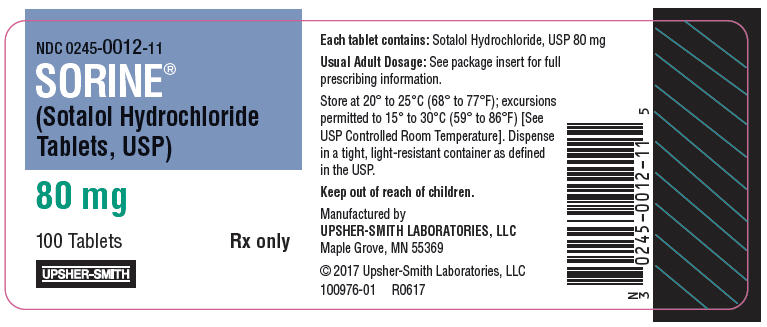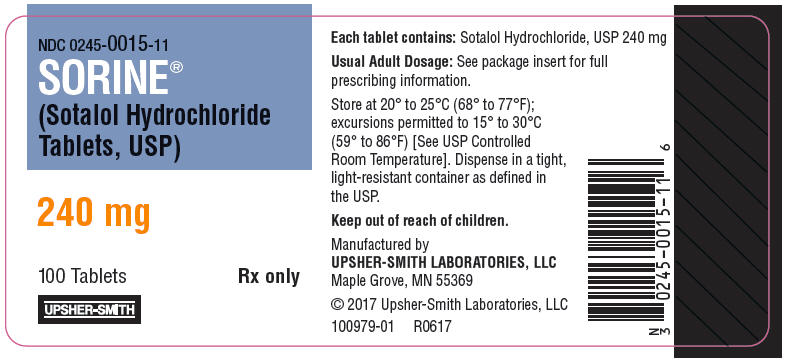There are high number of clear evidence that breastfeeding provides best nutrition that you can give to your baby. It is also evident that lactation is good for mothers health as well. Evolution has designed breastfeeding in a way that it caters all nutritional need of your child. However modern medicine is quite new for evolution, that is why mothers body is not well prepared to filter unnecessary chemical found in medicines. It becomes a necessity to figure out which drug is safe and which drug is dangerous for your newborn while nursing. In this article we will understand function of Sorine | Sotalol Hydrochloride Tablet and its suitability with breastfeeding.
What is Sorine | Sotalol Hydrochloride Tablet used for?
SORINE (sotalol hydrochloride) is an antiarrhythmic indicated for: the treatment of life-threatening ventricular arrhythmias (1.1) the maintenance of normal sinus rhythm in patients with atrial fibrillation or flutter (AFIB/AFL) (1.2) Limitations of Use Avoid use in patients with asymptomatic ventricular premature contraction (1.1) Avoid use in patients with minimally symptomatic or easily reversible AFIB/AFL (1.2) 1.1 Life-Threatening Ventricular Arrhythmias SORINE (sotalol hydrochloride) tablets are indicated for the treatment of life-threatening, documented ventricular arrhythmias, such as sustained ventricular tachycardia (VT). Limitation of Use: SORINE (sotalol hydrochloride) tablets may not enhance survival in patients with ventricular arrhythmias. Because of the proarrhythmic effects of SORINE (sotalol hydrochloride) tablets, including a 1.5% to 2% rate of Torsade de Pointes (TdP) or new ventricular tachycardia/fibrillation (VT/VF) in patients with either non-sustained ventricular tachycardia (NSVT) or supraventricular arrhythmias (SVT), its use in patients with less severe arrhythmias, even if the patients are symptomatic, is generally not recommended. Avoid treatment of patients with asymptomatic ventricular premature contractions [see Warnings and Precautions (5.2)]. 1.2 Delay in Recurrence of Atrial Fibrillation/Atrial Flutter (AFIB/AFL) SORINE (sotalol hydrochloride) tablets are indicated for the maintenance of normal sinus rhythm (delay in time to recurrence of AFIB/AFL) in patients with symptomatic AFIB/AFL who are currently in sinus rhythm. Limitation of Use: Because SORINE (sotalol hydrochloride) tablets can cause life-threatening ventricular arrhythmias, reserve its use for patients in whom AFIB/AFL is highly symptomatic. Patients with paroxysmal AFIB that is easily reversed (by Valsalva maneuver, for example) should usually not be given SORINE (sotalol hydrochloride) tablets.
What are the risk associated with Sorine | Sotalol Hydrochloride Tablet usage while breastfeeding? What precautions shall I take while using it in breastfeeding?
Sotalol hydrochloride is the one and only active ingredient present in Sorine | Sotalol Hydrochloride Tablet. Sotalol hydrochloride in itself is a low risk drug for lactation so it is easy to understand that Sorine | Sotalol Hydrochloride Tablet also comes in category of Low Risk item while breastfeeding. Below is the summary of Sotalol hydrochloride in breastfeeding.
Statement of Manufacturer/Labeler about breastfeeding usage
8.3 Nursing Mothers Sotalol is excreted in the milk of laboratory animals and has been reported to be present in human milk. Discontinue nursing on SORINE.
Sorine | Sotalol Hydrochloride Tablet Breastfeeding Analsys
Low RiskCAS Number: 3930-20-9
No adverse effects have been reported, but check-up for the possibility of sedation, hypotension, hypoglycemia or bradycardia.
Sorine | Sotalol Hydrochloride Tablet Breastfeeding Analsys - 2
CAS Number: 3930-20-9
Because of its extensive excretion into breastmilk, its renal excretion and minimal safety data in breastfed infants, other beta-adrenergic blocking drugs are preferred to sotalol, especially while nursing a newborn or preterm infant. Some authors recommend using sotalol during breastfeeding only while monitoring the infant closely for signs of beta-blockade.[1] Infants over 2 months of age have more mature kidney function and are less likely to be affected by sotalol in milk.

What should I do if I am breastfeeding mother and I am already exposed to Sorine | Sotalol Hydrochloride Tablet?
Sorine | Sotalol Hydrochloride Tablet is in the category of low risk, if you have already used it then its not a big deal if health and behavior of baby is good. However your health care provider shall be aware of the fact that you have used Sorine | Sotalol Hydrochloride Tablet so you should inform him based on your convenience.
I am nursing mother and my doctor has suggested me to use Sorine | Sotalol Hydrochloride Tablet, is it safe?
Sorine | Sotalol Hydrochloride Tablet comes in category of low risk and if your doctor is aware that you are breastfeeding it should be ok to use without much concerns.
If I am using Sorine | Sotalol Hydrochloride Tablet, will my baby need extra monitoring?
Not much monitoring required while using Sorine | Sotalol Hydrochloride Tablet
Who can I talk to if I have questions about usage of Sorine | Sotalol Hydrochloride Tablet in breastfeeding?
US
National Womens Health and Breastfeeding Helpline: 800-994-9662 (TDD 888-220-5446) 9 a.m. and 6 p.m. ET, Monday through Friday
UK
National Breastfeeding Helpline: 0300-100-0212 9.30am to 9.30pm, daily
Association of Breastfeeding Mothers: 0300-330-5453
La Leche League: 0345-120-2918
The Breastfeeding Network supporter line in Bengali and Sylheti: 0300-456-2421
National Childbirth Trust (NCT): 0300-330-0700
Australia
National Breastfeeding Helpline: 1800-686-268 24 hours a day, 7 days a week
Canada
Telehealth Ontario for breastfeeding: 1-866-797-0000 24 hours a day, 7 days a week
Drug Brands with same Active ingredients



